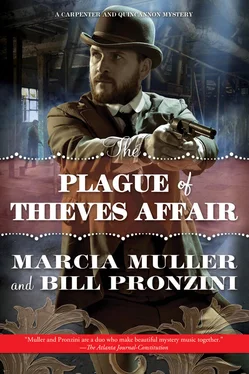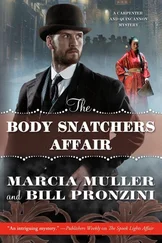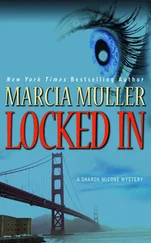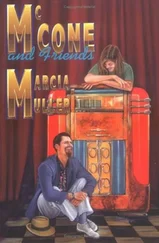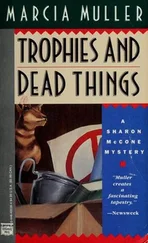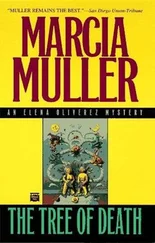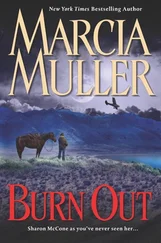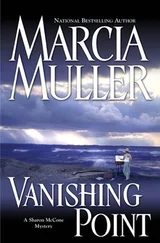He took himself downstairs to the brick-walled corridor leading to the cellars. A gaggle of workers had clustered there, drawn by fast-spread word of the shooting; he pushed his way through them to join the grim-faced Malloy. The two of them waited together in silence, the only sounds in the dank passage the muttering voices of the gathered men.
The wait lasted no more than ten minutes, a fast response for a change by an “ace detective” from the Hall of Justice. Quincannon’s hope was that the officer in charge would be one he didn’t know or knew only slightly, but he had no such luck. In fact, the man leading the half-dozen coppers who arrived on the scene was the one he least wanted to see — the beefy, red-faced Prussian named Kleinhoffer with whom he’d had run-ins in the past. Kleinhoffer was an incompetent political toady with dubious morals and a strong dislike of private detectives. His opinion of Quincannon was on a par with Quincannon’s opinion of him.
When the dick spied him, his color darkened and his beady eyes and thin mouth pinched into a glower. “You, Quincannon. What the devil are you doing here?”
“Plying my trade, same as you.”
“He’s been here the past few days,” Malloy said.
“Has he now. Doing what, exactly?”
“Inspecting the premises. He’s a safety inspector for the Department of Public Works... isn’t he?”
“No, he isn’t. He’s a flycop who keeps sticking his nose in places where it doesn’t belong. What are you really doing here, Quincannon?”
“I’m not at liberty to say without permission of my client.”
“And who would that be?”
“James Willard, the brewery’s owner.”
“Yes? Is he here now?”
“No. Away at a meeting. But he should be back soon.”
Murmurs of surprise had rippled through the listening workmen. One of them piped up, “I saw this man chasing Mr. Lansing through the fermenting room a while ago.”
“Is that so. Who’s Lansing?”
“The assistant brewmaster,” Malloy said. “The man who shot himself.”
“Shot himself, eh? You’re sure this flycop didn’t do it?” His tone implied that he’d like nothing better.
Quincannon said, “I had no reason to, nor could have done it if I had. I have no key to these doors — both of which were locked by Lansing when I got here. And still are, as you’ll soon see.”
“Then why were you chasing Lansing?”
“I can’t say without permission of Mr. Willard.”
Elias Corby stepped forward. “It couldn’t have anything to do with Otto Ackermann’s death, could it? That was a tragic accident.”
“What’s that?” Kleinhoffer said. “There’s been another death here recently?”
“Last week. Poor Otto, our brewmaster, slipped off a catwalk and drowned in a vat of fermenting beer. A terrible way to die, terrible. But it was an accident, as I said. The precinct officers who came to investigate ruled it as such.”
“First the brewmaster, then the assistant brewmaster — an accident and an apparent suicide. Sounds fishy to me. Well, Quincannon? Is there some sort of connection or isn’t there?”
“I can’t say without—”
Kleinhoffer snapped, “Scheisse,” glared daggers at him, and then turned to Malloy. “You have the key? All right, open the doors and let’s have a look at the stiff.”
Malloy hastened to do his bidding. Kleinhoffer and his usual shadow, a burly sergeant named Mahoney, shouldered their way inside, taking the foreman with them. Quincannon made no attempt to join them; it was unnecessary — he’d already seen all there was to see in the utility room — and Kleinhoffer wouldn’t have allowed it anyway. The other coppers, four bluecoats, held him and the rest of the onlookers at a distance.
The Prussian and his shadow blundered around inside for ten minutes, making a good deal of noise in the process. The workmen all gave Quincannon a wide berth, as if he’d been revealed as a none-too-savory and possibly dangerous spy. When the two plainclothesmen reappeared, Kleinhoffer attempted to question Quincannon again, using thinly veiled threats this time. This tactic got him nowhere, the threats being nothing but empty bluster. Grumbling, he and Mahoney proceeded to interrogate Jack Malloy and several other employees, none of whom had anything pertinent to tell.
Two nearly simultaneous arrivals put a halt to the questioning. First came the morgue wagon and a pair of attendants with a stretcher, followed less than a minute later — and not a moment too soon, by Quincannon’s reckoning — by Mr. James Willard.
“Caleb Lansing, a murderer and a thief,” Willard said in mournful tones. “My God, I can hardly believe it.”
“There’s no doubt he was guilty of both crimes,” Quincannon said.
Kleinhoffer said sourly, “So you say. How do you know he killed the brewmaster for the steam beer formula? According to the bookkeeper, the official verdict is that Ackermann drowned accidentally.”
“The official ruling was wrong.”
“Smart flycop. Think you know everything.”
“Murder when murder’s been done for profit, yes.”
The three men were in Willard’s office, where they’d gone for the sake of privacy. The news of Lansing’s betrayal and apparent suicide — a second death by violence in the Golden State in a week’s time — had shocked Willard into a lather; his florid features were mottled, veins bulged and pulsed in both temples as if he might be in danger of a seizure. After a brief consultation out of Kleinhoffer’s hearing, he had agreed to permit an explanation of why he’d hired a detective to investigate Otto Ackermann’s demise. Which Quincannon had then given as succinctly and in as little detail as possible. It was not yet time to hand over the burned note fragment he’d found, or to reveal the presence of the two thousand dollars in the strongbox hidden in Lansing’s rooms — the latter in particular, given Kleinhoffer’s less than stellar reputation for honesty.
“All right, then,” Kleinhoffer said when he’d finished. “How’d you get onto Lansing?”
“Astute detective work, naturally.” Quincannon resisted adding that such was something the beefy dick knew little about.
“That doesn’t answer my question.”
“Under the circumstances the exact nature of my investigation is my and my client’s concern, not the police’s.”
“The stolen formula is police business.”
“Only if my client chooses to make it so.”
“Well? Do you, Mr. Willard?”
“No.”
Kleinhoffer ground his yellowed teeth. “What did Lansing do with the formula?” he demanded of the brewery owner. “Who hired him ?”
Willard glanced at Quincannon, who imperceptibly shook his head. “I don’t know.”
“Meaning you’re gonna be as closemouthed as the flycop here.”
“Meaning I don’t know. Neither does Mr. Quincannon, or he would have said so.”
“Lansing may not have been hired by anyone,” Quincannon said glibly. “He may have acted with the idea of selling the formula to the highest bidder. I’ll find out, in any case, if Mr. Willard should want me to continue in his employ.”
“I do,” Willard said.
Kleinhoffer said, “Scheisse.”
Quincannon suppressed a grin. “Are you satisfied that Lansing’s death was a suicide?” he asked.
“Couldn’t be anything else,” the Prussian admitted grudgingly. “You trapped him down there in that utility room and he took the coward’s way out.”
“So he must have been guilty as I’ve charged.”
“Or just plain off his trolley.”
“In any event, as far as the law is concerned the case is closed. There’s no need for you to concern yourself with the stolen formula, Lansing’s motives, or anything else to do with the matter.”
Читать дальше
